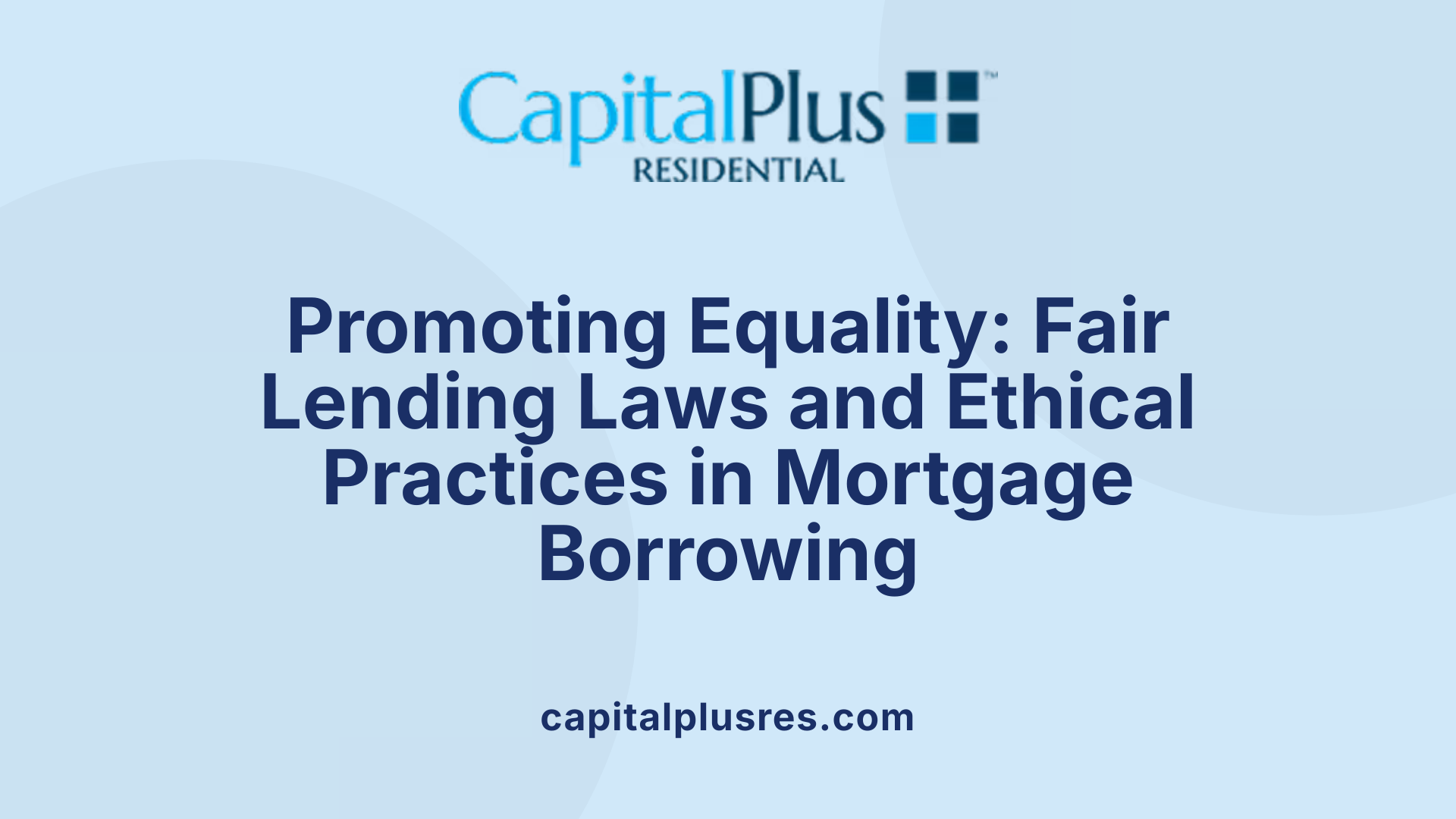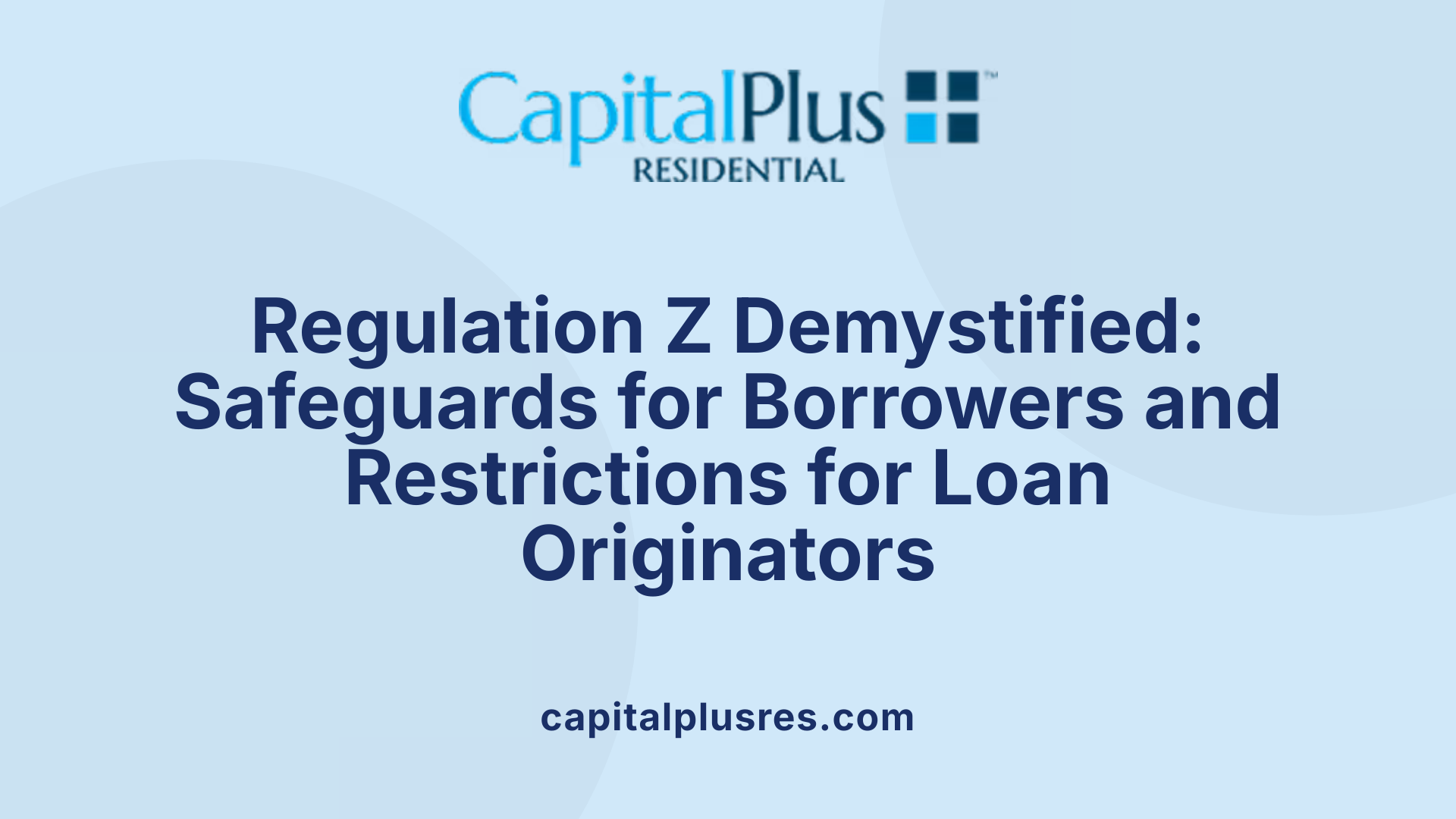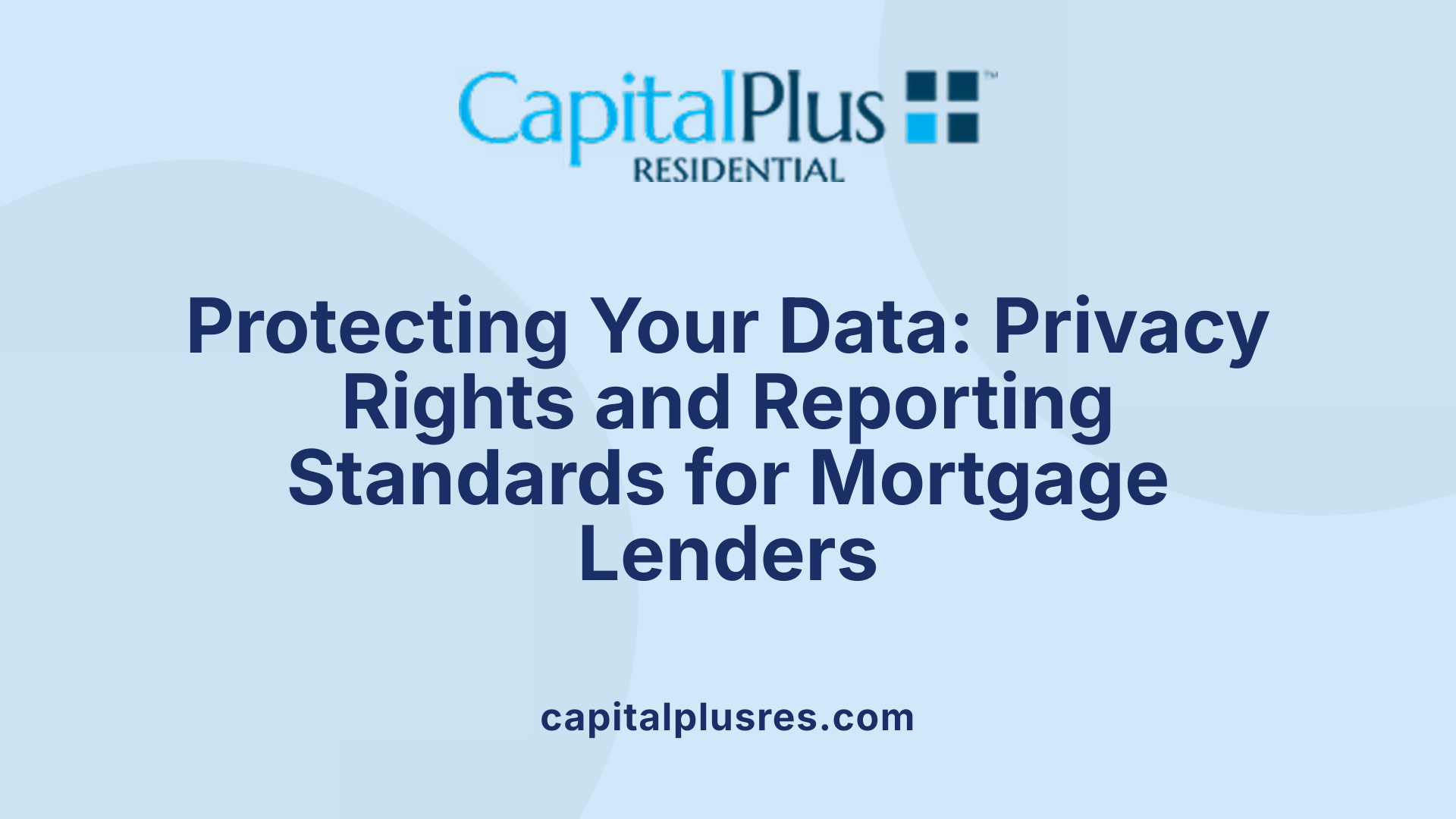Demystifying Mortgage Laws for California Homebuyers
Understanding the complexities of mortgage laws is crucial for homeowners and prospective buyers alike. These laws are designed to protect consumers and ensure fair and transparent lending practices. This article explores the key legal frameworks governing residential mortgage lending, focusing on California's regulatory environment, federal protections, and what borrowers need to know to safeguard their rights throughout the lending process.
California Residential Mortgage Lending Act: The Foundation of State Licensing and Regulation

What is the Purpose and Scope of the CRMLA?
The California Residential Mortgage Lending Act (CRMLA) was enacted in 1994 and became effective in 1996 to regulate residential mortgage lending activities in California. It governs the origination and servicing of residential mortgage loans and offers an alternative licensing framework to other state laws such as the Real Estate Law and the California Finance Lenders Law. The CRMLA applies comprehensively to persons engaged in making or servicing residential mortgage loans within California, ensuring a regulated mortgage marketplace.
What are the Licensing Requirements for Mortgage Lenders and Servicers?
Under the CRMLA, entities must obtain a license to operate as mortgage lenders, servicers, or both. Applicants undergo background checks, fingerprinting, and document submissions via the Nationwide Mortgage Licensing System (NMLS). Licensees may also include bona fide nonprofit organizations, with specific exemptions outlined. The licensing process ensures that mortgage entities meet the state's standards for financial responsibility and operational integrity.
What Authority is Granted to Licensed Entities?
CRMLA licensees are empowered to make federally related mortgage loans, finance home construction, and service loans. They may sell residential mortgage loans to institutional investors and provide contract underwriting services. Licensed lenders can also act as mortgage brokers by procuring loans on behalf of borrowers from institutional lenders, extending the services available under the CRMLA framework.
What Role Does the Department of Financial Protection and Innovation (DFPI) Play?
The DFPI oversees licensing, regulation, and enforcement of CRMLA licensees to foster a trustworthy financial environment. It monitors licensee compliance through annual reports like the Residential Mortgage Loan Reports and the Holden Act Reports. The DFPI also provides consumer resources such as the NMLS Consumer Access platform, enabling transparency and complaint filing.
How are Industry Compliance and Oversight Managed?
Compliance with the CRMLA is supported by ongoing reporting requirements and adherence to federal consumer protection laws including the Truth in Lending Act and Equal Credit Opportunity Act. Detailed regulations govern loan origination practices, compensation, disclosures, and non-discriminatory lending. The DFPI enforces these standards and guides risk management when licensees purchase loans from third parties, ensuring both consumer protection and industry accountability.
Licensing and Consumer Transparency: Protecting Borrowers in the Mortgage Market

Who Must Be Licensed Under the CRMLA?
Any individual or entity engaged in the business of making or servicing residential mortgage loans in California must obtain a license under the California Residential Mortgage Lending Act (CRMLA). This ensures that all lenders and servicers comply with state standards designed to protect consumers.
How Is Licensing Managed?
The licensing process is conducted through the Nationwide Mortgage Licensing System (NMLS). Applicants submit various documents, including fingerprints and background checks, via this platform. The NMLS streamlines licensing and supports uniformity and transparency across states.
How Can Consumers Verify Licensees?
Consumers can access information about licensed mortgage companies, their branches, and individual loan originators through the NMLS Consumer Access platform. This publicly available tool provides details helping borrowers make informed decisions.
What Are the Procedures for Filing Complaints?
The Department of Financial Protection and Innovation (DFPI) accepts consumer complaints against licensees. The complaint process aims to resolve issues efficiently, maintaining trust in the mortgage lending market.
Are There Exemptions and Employer Guidelines?
Bona fide nonprofit organizations are exempt from licensing under certain conditions specified by the CRMLA. Additionally, the DFPI offers guidance to companies employing mortgage loan originators, ensuring regulatory compliance and support for employers in navigating licensing requirements.
This framework promotes responsible lending and protects borrowers by ensuring transparency, accountability, and access to recourse within California’s residential mortgage market.
Key Federal Consumer Protection Laws Influencing Mortgage Lending
What Are the Main Federal Consumer Protection Laws in Mortgage Lending?
Mortgage lending in California is strongly influenced by several federal consumer protection laws designed to safeguard borrowers and ensure fair practices. Among the prominent laws are:
- Truth in Lending Act (TILA): Mandates transparent disclosure of loan terms and limits liability for loan assignees.
- Equal Credit Opportunity Act (ECOA): Prohibits discrimination in credit transactions.
- Fair Housing Act (FHA): Bans discriminatory practices in housing-related credit.
- Home Mortgage Disclosure Act (HMDA): Requires lenders to collect and report data on loan applications.
- Gramm–Leach–Bliley Act (GLBA): Protects consumer privacy related to financial information.
What Are Borrower Rights Under These Laws?
Borrowers enjoy several protections that ensure fairness and transparency:
- Under TILA, borrowers have the right to clear disclosures about loan costs, with a three-day rescission window to cancel certain home-secured loans. This window can extend up to three years if disclosures are inaccurate.
- ECOA and FHA guarantee that borrowers are not subject to discrimination based on race, gender, or other protected classes when applying for or purchasing loans.
- HMDA promotes accountability by requiring lenders to report loan data, helping identify discriminatory lending patterns.
- GLBA ensures consumers are informed about how their financial data is shared, often providing opt-out options.
How Do These Laws Affect Mortgage Loan Purchasing and Servicing?
Licensees under the California Residential Mortgage Lending Act must comply with these federal laws while originating and servicing loans. This includes ensuring nondiscriminatory purchase practices, providing timely notices when loan ownership changes, and maintaining transparency and privacy in handling consumer data.
Lenders purchasing federally related mortgage loans must also follow strict guidelines:
- Notify borrowers within 30 days of ownership transfer, detailing the new creditor's identity and transfer date under TILA.
- Avoid discriminatory refusals or conditioning of loan purchases as prohibited under ECOA and FHA.
What Are the Limitations on Loan Assignee Liability Under TILA?
Loan assignees — those who acquire loans — face limited liability for TILA violations. They are typically only responsible for violations apparent on the disclosure statement’s face. The act specifies standards for assessing different violation types to balance accountability with operational clarity.
What Specific Protections Do Borrowers Have Regarding Rescission?
Borrowers have the right to rescind certain loans secured by their principal residence within three business days of loan consummation. If accurate disclosures are not provided, this rescission period can extend up to three years. This right offers a safeguard against rushed or ill-advised loan commitments.
This complex federal framework complements California's regulatory structure, ensuring mortgage lending remains a transparent, fair, and consumer-friendly industry.
Notification and Disclosure Requirements When Mortgage Ownership Changes
What are the obligations of new mortgage owners?
When ownership of a residential mortgage loan changes hands, the new mortgage owner has specific obligations to ensure that borrowers are kept fully informed. The new creditor must formally notify the borrower that their loan has been transferred.
What are the timelines for borrower notification?
The law mandates that this notification must occur within 30 days of the transfer of ownership. This timely communication prevents confusion or miscommunication regarding the party responsible for loan servicing.
What information must be included in transfer notices?
The notice to the borrower must include several key details:
- The identity of the new creditor who now owns the loan
- The effective date of the transfer
- Contact information for the new creditor's servicing office
- Instructions on how and where payments should be sent This comprehensive disclosure ensures that borrowers can promptly and correctly adjust their payment routines.
How do these requirements ensure transparency and consumer awareness during loan transfers?
These notification and disclosure requirements are central to maintaining transparency in residential mortgage lending. Borrowers are empowered to verify the legitimacy of the new owner, prevent payment errors, and address any servicing issues early. The regulation supports consumer protection by making the loan transfer process clear and accountable.
By mandating timely, detailed notifications, the California Residential Mortgage Lending Act and related regulations help maintain trust in mortgage lending and servicing transactions.
Ensuring Fair Lending: Legal Prohibitions on Discrimination and Steering Practices

What prohibitions exist under ECOA and FHA regarding mortgage loans?
The Equal Credit Opportunity Act (ECOA) and the Fair Housing Act (FHA) firmly prohibit discriminatory practices in purchasing or financing residential mortgage loans. This includes making it illegal to refuse to purchase loans or finance based on race, color, religion, sex, national origin, familial status, or disability.
How do fair lending protections apply during loan purchase and financing?
These laws ensure that lenders and investors cannot impose different terms, conditions, or prices for loans based on prohibited factors. They promote equal access to credit and prohibit unfair treatment in both originating and purchasing mortgage loans.
What does Regulation Z Section 1026.36 say about steering and compensation?
Section 1026.36 of Regulation Z restricts loan originators from steering consumers toward loans that yield higher compensation unless that loan is clearly in the consumer's interest. It bans payments based directly or indirectly on transaction terms like interest rates or fees to prevent undue influence on loan terms.
Are there safe harbor provisions for loan originators?
Yes. Safe harbor rules allow loan originators to avoid liability if they provide consumers with multiple loan options and clearly disclose differences, ensuring transparency about compensation and loan features.
How can unethical practices in mortgage origination be avoided?
Avoiding unethical practices involves strict compliance with fair lending laws and Regulation Z. Originators must not base compensation on specific loan terms, avoid steering consumers, provide clear NMLSR ID disclosure, and refrain from using mandatory arbitration or waivers of consumer rights. This safeguards consumers and sustains a fair mortgage market.
Understanding Regulation Z: Safeguards and Restrictions for Loan Originators

What defines a loan originator under Regulation Z?
Regulation Z characterizes a loan originator as any individual who refers, arranges, assists, or advertises the origination of a residential mortgage loan. This includes activities such as helping a borrower through the application process or negotiating terms. However, exemptions exist for real estate brokers, third-party advisors, and certain seller financers.
What restrictions are placed on loan originator compensation?
Regulation Z strictly prohibits loan originators from receiving payments based on the loan’s terms—including interest rates, fees, and the type of collateral. Compensation must be carefully limited to eliminate incentives that could improperly influence loan terms. Specific bans include steering consumers to loans that generate higher compensation unless the choice benefits the consumer.
What are the documentation requirements for loan originators?
Loan originators must clearly and prominently display their Nationwide Mortgage Licensing System & Registry (NMLSR) ID and full name on all relevant loan documents. This transparency helps borrowers identify the parties involved in loan origination and supports regulatory oversight.
Are mandatory arbitration and waivers of consumer rights allowed?
Regulation Z forbids mandatory arbitration clauses and waivers of consumer rights within loan origination documents. Borrowers maintain full rights to pursue legal action or dispute resolution outside of forced arbitration, reinforcing consumer protections in mortgage transactions.
Which types of mortgage products fall under Regulation Z’s scope?
Regulation Z applies to various credit transactions secured by dwellings, including closed-end mortgages, reverse mortgages, and home equity lines of credit (HELOCs). The regulation details specific provisions related to credit practices, servicing requirements, and payoff statements. It also mandates counseling for products with negative amortization potential.
This array of safeguards under Regulation Z ensures responsible loan origination, prioritizes consumer interests, and aligns with broader federal compliance standards in residential mortgage lending.
Privacy and Data Reporting Obligations for Mortgage Lenders

What are the GLBA privacy provisions and consumer opt-out rights?
The Gramm–Leach–Bliley Act (GLBA) requires financial institutions, including mortgage lenders, to protect consumers' nonpublic personal information. Lenders must disclose how they share customer data with third parties and provide clear opt-out options for consumers, meaning borrowers can prevent their information from being shared in certain circumstances. Certain exceptions apply, but the goal is transparency and control over personal data.
What are HMDA reporting requirements for lenders?
The Home Mortgage Disclosure Act (HMDA) mandates that many lenders collect and report data on loan applications and originations. This includes loans that are purchased by these lenders. HMDA aims to ensure fair access to credit and identify discriminatory lending patterns by requiring detailed reporting on the characteristics of borrowers and loans.
Which lenders are exempt from HMDA reporting?
There are specific exemptions under HMDA, including small lenders and insured depository institutions with limited assets or loan activities. These exemptions help reduce the regulatory burden on smaller players while focusing oversight on lenders with significant market presence.
How important is third-party risk management when purchasing loans?
Mortgage lenders often purchase loans from third parties. Effective risk management programs are critical to ensure compliance with applicable laws and to mitigate operational risks associated with these transactions. Careful oversight of third-party sellers through contracts and monitoring protects both consumers and lenders.
Why is compliance monitoring and reporting vital?
Mortgage lending involves complex regulations that require ongoing compliance monitoring. Regular reporting, such as CRMLA Annual Reports and the Holden Act Reports, along with adherence to federal laws, helps detect issues early. This oversight supports consumer protection and maintains a trusted financial marketplace in California.
Borrower Rights: Loan Rescission and Counseling Requirements
What is the right of rescission for certain mortgage loans?
Borrowers have a legal right to rescind, or cancel, certain mortgage loans that are secured by their principal dwelling. This right allows consumers to reconsider the transaction and cancel the loan agreement if needed.
What is the standard rescission period and are there extensions?
The standard rescission period is three business days after loan closing. However, if the required disclosures are inaccurate or incomplete, this period can extend up to three years. This extension provides borrowers additional protection to ensure they are fully informed about their loan terms.
What are the requirements for negative amortization counseling?
For loans involving negative amortization—where loan balances can increase over time—borrowers must receive proper counseling. This requirement helps consumers understand how their loan might grow and impacts their repayments, ensuring they make informed decisions.
What are the qualification and compliance requirements for loan originators?
Loan originators must meet detailed qualification standards and comply with federal laws designed to protect borrowers. Regulations prohibit steering borrowers towards loans with higher fees or compensation arrangements that are not in their best interest. Originators must clearly disclose their identity, including National Mortgage Licensing System (NMLS) IDs, on relevant loan documents.
How do these protections ensure informed decisions during complex loan transactions?
These combined protections—including the right of rescission, counseling requirements, and strict originator compliance rules—ensure borrowers fully understand complex loan terms. They help prevent unfair lending practices and promote transparency, empowering consumers to choose mortgage solutions suitable for their financial circumstances.
Maintaining a Trusted Financial Marketplace Through Regulation and Oversight
Role of the DFPI in licensing, regulation, and oversight
The California Department of Financial Protection and Innovation (DFPI) plays a pivotal role in fostering a healthy and trusted financial marketplace. It achieves this through comprehensive licensing, vigilant regulation, and constant oversight of lenders and servicers operating under the California Residential Mortgage Lending Act (CRMLA). These actions ensure that mortgage loan businesses comply with laws designed to protect consumers and promote fair lending practices.
Annual reports such as Residential Mortgage Loan and Holden Act Reports
To monitor industry trends and maintain transparency, the DFPI publishes annual documents including the Residential Mortgage Loan Report and the Holden Act Report. These reports provide valuable insights into mortgage lending activities, regulatory compliance, and market conditions, helping stakeholders stay informed and responsive to changes.
Consumer complaint management and industry transparency
The DFPI enhances consumer protection by facilitating complaint filing through platforms like the Nationwide Mortgage Licensing System (NMLS) Consumer Access. This system not only allows consumers to report issues easily but also offers access to detailed license information about mortgage companies, branches, and individual loan originators, thus promoting transparency and accountability within the industry.
Best practices for mortgage loan servicing and compliance
Mortgage servicers and lenders licensed under CRMLA must adhere to best practices, which include following the latest regulatory guidance on nontraditional and adjustable rate mortgage products. The DFPI provides clear guidelines and enforces compliance to ensure that servicing practices protect borrower interests and uphold federal and state standards.
Importance of ongoing monitoring for protecting consumer interests
Continuous oversight through regular reporting and compliance reviews is critical to safeguarding consumers. Ongoing monitoring helps identify and mitigate risks such as discriminatory lending practices, improper loan servicing, and violations of consumer rights. This rigorous supervision reaffirms the commitment to protecting borrowers and maintaining trust in California's mortgage lending market.
Empowering Borrowers Through Knowledge and Legal Protections
Being aware of your rights under mortgage laws is a vital step towards making informed decisions and protecting yourself throughout the home buying and loan servicing process. California's comprehensive regulatory framework under the CRMLA, complemented by federal consumer protection statutes, ensures borrowers receive transparent, fair treatment from licensed mortgage professionals. By understanding licensing requirements, fair lending protections, disclosure obligations, and your rights to rescission and privacy, you can navigate the complexities of residential mortgage lending with greater confidence. Regulatory agencies like the DFPI and consumer access platforms further empower borrowers by promoting transparency and accountability in the mortgage industry. Ultimately, knowledge of these protections not only safeguards your financial interests but also contributes to a healthier and more trusted housing finance market.









